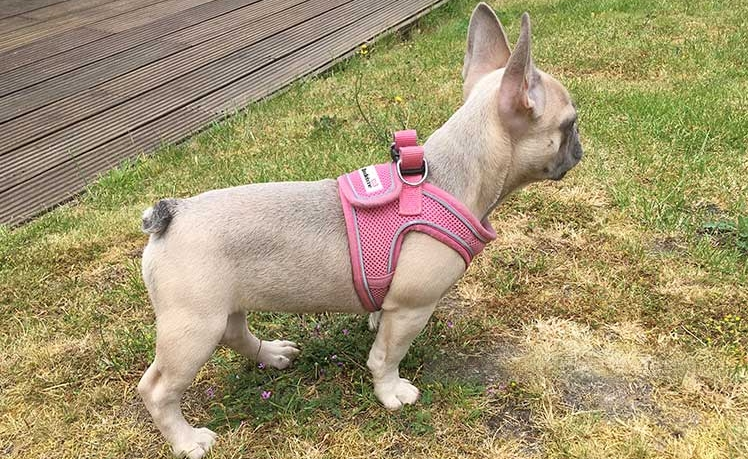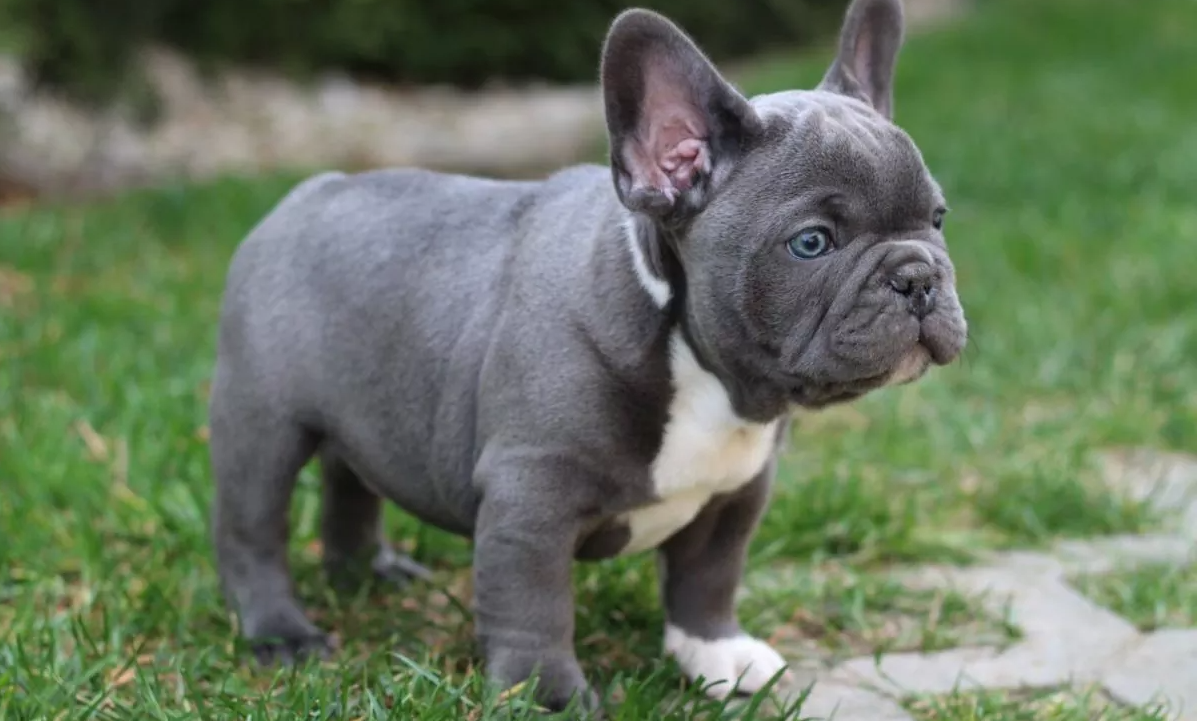French Bulldogs are adorable creatures that are loved by many. They are affectionate and loyal and make great pets for families and individuals. French Bulldogs can be susceptible to health issues that may considerably decrease their well-being. For example, breathing problems are a common concern for pet owners, and it’s essential to comprehend the condition and how to properly look after your pup if you’re an owner of one. To guarantee your Frenchie remains healthy and contented, ensure you understand everything regarding this issue.
Causes Of Breathing Problems While Sleeping A French Bulldog
Brachycephalic Obstructive Airway Syndrome: (BOAS)
A disorder known as Brachycephalic Obstructive Airway Syndrome frequently contributes to breathing issues in French Bulldogs (BOAS). French Bulldogs and other canines with short snouts are particularly prone to this problem. BOAS is a collection of anatomical anomalies that make breathing challenging for dogs, mainly when sleeping or exercising.
Narrow Nostril
A narrow nostril opening, one of the primary physical anomalies linked to BOAS, can make breathing challenging for dogs via their noses. Because breathing through the mouth is less efficient and might result in snoring or other breathing disturbances, this may cause dogs to do so.
Enlarged Soft Palate
An enlarged soft palate is another typical anomaly connected to BOAS. The soft palate is the tissue at the back of the throat that divides the nasal cavity from the mouth. The soft palate is typically shorter in dogs with BOAS, which can clog the airway and make breathing challenging. Snoring, gag reflexes, and even choking might result from this.
Other Physical Anomalies
Tiny windpipe, narrow nasal passageways, and a small trachea are other physical anomalies connected to BOAS. Any of these elements may make breathing harder for French Bulldogs, which might cause breathing problems.
French Bulldogs’ Signs Of Respiratory Problems
Breathing problems in French Bulldogs can range from minor to severe, depending on how bad the illness is. Typical signs of respiratory issues in French Bulldogs include:
- Loud breathing or snoring: When French Bulldogs with BOAS breathe or sleep, they frequently snore or breathe loudly. It can indicate that they aren’t getting enough oxygen.
- Dogs with BOAS may gag or choke when eating or drinking, mainly if they do it too quickly.
- Exercise difficulty: Dogs with BOAS may find exercising challenging, particularly in hot weather or when agitated. They could pant excessively or struggle to follow other dogs.
- Tiring quickly: Dogs with BOAS may tire easily, even after short walks or play sessions.
- Blue gums or tongue: Under challenging situations, dogs with BOAS may exhibit blue gums or tongue, a symptom of inadequate oxygenation.
- Collapse: In a small percentage of cases, dogs with BOAS may pass out from severe respiratory problems.
It’s critical to get your French Bulldog checked out by a veterinarian if you observe any of these symptoms.
French Bulldogs’ Respiratory Issues: Their Causes
Several things, such as heredity, way of life, and anatomy, can bring on French Bulldogs’ breathing issues. The following are some typical reasons why French Bulldogs have respiratory issues:
- Genetics: French Bulldogs are a brachycephalic breed, which means they have a short snout and flat face. This anatomy can make it difficult for them to breathe, especially if they have inherited other anatomical abnormalities associated with BOAS.
- Obesity: Being overweight can exacerbate breathing difficulties in French Bulldogs by putting extra pressure on their airways.
- Hot weather: Dogs with BOAS may have difficulty breathing in hot weather, as they cannot pant as efficiently to cool down.
- Exercise: When exercising, dogs with BOAS may have trouble breathing, especially if they are overexercised if the weather is hot.
- Allergies: Allergies can lead to airway irritation, making breathing challenging for dogs.
- Infections: Respiratory infections can aggravate airway inflammation, making breathing challenging for dogs.
It’s crucial to remember that rather than having just one cause, respiratory problems in French Bulldogs frequently combine several causes.
French Bulldog Breathing Issues: Prevention And Treatment
Although it’s not always possible to stop French Bulldogs from having respiratory problems, there are things dog owners can do to assist in managing the illness and enhance their dog’s quality of life. Here are some suggestions for preventing and treating French Bulldogs’ respiratory issues:
- Ensure your French Bulldog maintains an ideal weight: Keeping your pet at a healthy size will lessen the strain on their airways, making it more straightforward for them to breathe.
- Please avoid extreme heat: Unlike other breeds, French Bulldogs are more likely to endure heatstroke; consequently, you should always keep them inside with AC or give them access to a shady space outside where they can rest comfortably.
- Moderate Exercise: Even though it’s essential to ensure French Bulldogs with respiratory complications are not overstressed, they still need exercise. Short strolls or activities in cooler climates are ideal.
- Stay away from irritants: To stop exacerbating your Frenchie’s allergies, avoid anything that can act as an irritant, such as smoke cigarettes, cleaners used around the house and certain types of bedding materials.
- Boost their bowls: Raising the food and water dishes of your French Bulldog can help minimize strain on their breathing passages, allowing them to breathe more easily when consuming or drinking.
- Go with a harness rather than a collar: Employing a harness as opposed to wearing around a neck strap helps decrease pressure on your Frenchie’s throat region, making it more straightforward for them to take breaths.
- Help your French Bulldog stay composed: Stress and over-stimulation can worsen breathing issues for French Bulldogs, so it’s critical to keep them tranquil and relaxed.
Physical Therapy And Breathing Drills For French Bulldogs
Your French Bulldog’s respiratory muscles can be strengthened with breathing exercises and physical treatment, making breathing more straightforward. Some exercises that may be helpful for dogs with breathing difficulties include:
- Slow breathing: Help your French Bulldog’s respiratory muscles by inspiring them to take deep, slow breaths; you can tenderly caress their chest and abdomen while inhaling.
- Yawning: Yawning can help your French Bulldog’s airways open up, making breathing simpler for them. You can accomplish this by yawning aloud or by gently caressing their jaw.
- Sniffing: Encourage your French Bulldog to sniff as it forces them to breathe in more air, which can build their respiratory muscles. Place a goodie close to their nose and nudge them to sniff it to accomplish this.
Physical therapy, in addition to these activities, may be beneficial for dogs who have trouble breathing. Your French Bulldog can benefit from physical therapy to bolster their respiratory muscles and enhance their breathing.
Medications And Surgical Options for French Bulldogs With Breathing Difficulties
French Bulldogs who have breathing problems sometimes need to be treated with medicine or surgery. Specific drugs that are frequently prescribed include:
- Bronchodilators: Dogs can breathe more easily thanks to bronchodilators, which help to widen the airways. They may be prescribed as a long-term solution or alleviating short-term respiratory problems.
- Steroids: Reducing airway inflammation can help dogs breathe more easily. They may be recommended to treat persistent respiratory problems.
- Antibiotics: If a respiratory infection is making it difficult for you to breathe, your doctor may prescribe antibiotics to treat the illness. For more severe cases, surgery can be required to treat French Bulldogs’ respiratory problems. Several popular surgical options are:
- Soft palate resection: Removing a part of the soft palate through surgery is known as a soft palate resection, which is done to lessen airway blockage.
- Nares surgery: Widening the nose apertures during nares surgery will increase airflow.
- Tracheostomy: To get around an upper airway obstruction, a hole is made in the trachea during surgery.
Based on your French Bulldog’s particular needs, your veterinarian will be able to identify the best course of action.
Caring for French Bulldogs with Breathing Difficulties
A French Bulldog with breathing problems demands special consideration and care. Here are some suggestions for taking good care of your pet:
- Give out a lot of water: You should always ensure your French Bulldog has access to plenty of fresh water. They may stay hydrated and breathe more efficiently as a result.
- Exercise supervision: Pay close attention to your French Bulldog’s workout routine and make any necessary adjustments. It could be time to stop exercising if they are having trouble breathing.
- Pay attention to your French Bulldog’s breathing patterns: Loud or snoring patterns could indicate a breathing problem. Keep an eye on this and, if necessary, take action.
- Provide a pleasant sleeping environment for your French Bulldog: A comfortable sleeping environment can help your French Bulldog feel less stressed and breathe easier. Examples of this are a humidifier to increase moisture in the air, a comfortable bed, or a cold environment.
- See the vet frequently: Regularly monitoring your French Bulldog’s breathing issues and ensuring they receive the required treatment can be accomplished through frequent clinic visits.
Considering French Bulldog Breeding
When it comes to handling breathing issues, breeding French Bulldogs can be a challenging task. Working with a reliable breeder who is informed about the breed and takes precautions to reduce the possibility of breathing problems in their puppies is vital. Consider the following when breeding French Bulldogs:
- Health testing: Health evaluations To make sure that neither the male nor the female has any anatomical defects that could be passed on to their puppies, it is crucial to do health tests on both before mating.
- Breeding age: French Bulldogs should wait to breed until they are at least two years old for their anatomy to develop fully.
- Frequency of breeding: French Bulldogs shouldn’t be bred more than once a year because doing so can place additional stress on their respiratory system.
- C-sections: Because of their wide hips and big heads, French Bulldogs frequently need C-sections to give birth.
Conclusion
Breathing difficulties in French Bulldogs can be a severe concern for pet owners, but it’s possible to help your furry friend breathe easily with the proper care and management. By understanding the causes, symptoms, and available treatment options, pet owners can work with their vet to develop a plan that meets their French Bulldog’s needs.
If you’re a French Bulldog owner, staying informed about your pet’s health and seeking veterinary care if you notice any signs of breathing difficulties is essential. Your French Bulldog can live a healthy and happy life with the proper care and attention.
Resources for French Bulldog owners



